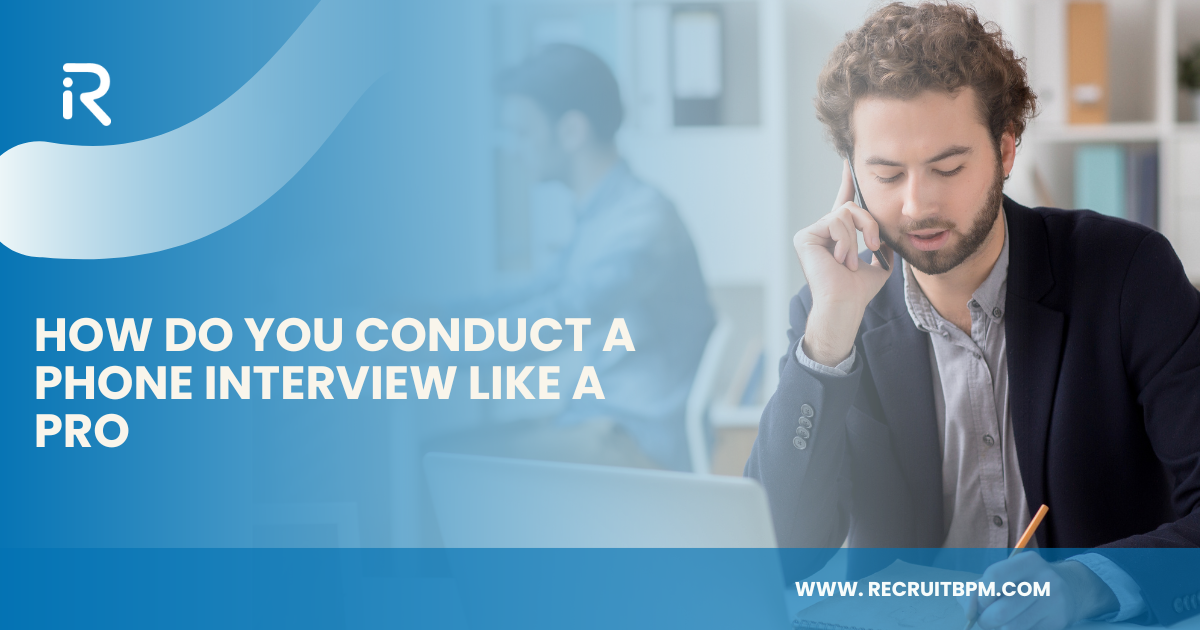
- Importance of Phone Interviews in the Hiring Process
- How Do You Conduct a Phone Interview? – Here’s What You Need to Know
- Benefits of Phone Interviews
- Using Technology in Phone Interviews
- The Future of Phone Interviews
- Final Word
- Discover More with RecruitBPM
-
FAQs
- How do you conduct a phone interview effectively?
- What is the ideal duration for a phone interview?
- How can I best assess a candidate’s truthfulness over the phone?
- Can I conduct a successful interview without a video call?
- Should I give immediate feedback during a phone interview?
- How many people should be on the interviewing end of a phone interview?
Throughout history, the world of work has always been a competitive field where initial battles are mostly fought on the phone.
The stakes may be as high in a mere phone interview as it is in its face-to-face counterpart.
For candidates, it’s either the next stage of the hiring process or an email regret.
The HR professionals and recruiters see this as their opportunity to separate between the great and ordinary candidates.
In this post, we’ll discuss how do you conduct a phone interview like a pro.
This article will take you through steps to making a call interview that doesn’t just satisfy the standards of professionalism but surpasses them.
Regardless of whether you’re a professional seeking fine-tuning for your skills or a fresh graduate preparing for your first job interview, this post will equip you with tips that will enable success.
Importance of Phone Interviews in the Hiring Process
Normally face-to-face interactions seem like the epitomes of personal bonding processes, but telephone interviewing is not ineffective at all.
These interviews act as an essential starting point where recruiters can appraise a candidate’s communication ability, professionalism and preliminary suitability for the position.
For candidates, acing a phone interview could mean securing an in-person meeting and ultimately the job.
This often means the phone interview is the first opportunity to make an impression so it’s essential to make sure that impression is a strong and favorable one.
How Do You Conduct a Phone Interview? – Here’s What You Need to Know
So how do you conduct a phone interview exactly? Read on for some amazing tips and practices.
1. Preparation Is Everything
The saying “failing to prepare is preparing to fail” rings especially true when it comes to phone interviews.
Here’s how you prepare to conduct an interview that leaves a lasting and positive impression on all participants.
-
Research the Company and the Candidate
Before the call interview, know the company inside and out. Understand its values, culture and current state.
This not only shows preparation on your part but also helps you customize your questions and measure the candidate’s understanding of where they’re likely headed.
Likewise, review the candidate’s resume and any additional materials they’ve provided.
Make a note of professional and personal achievements and point out any red flags that call for discussion.
-
Define Interview Objectives and Questions
Clearly defined objectives are your roadmap through the call interview. Decide beforehand on the capabilities and skills you wish to focus on.
Are you measuring technical competence, cultural fit or something else entirely?
Ask questions that will yield valuable information.
Open-ended questions can’t be answered with a simple ‘yes’ or ‘no,’ and situational questions can help predict a candidate’s behavior under certain circumstances.
-
Pre-Interview Communication
Effective communication prior to interviewing is an essential step of how do you conduct a phone interview.
Confirm the interview time via email and include any necessary details such as the expected duration and whether there will be any specific topics or tests included.
This not only demonstrates professionalism but also helps set clear expectations and reduces anxiety for the candidate.
-
Ensure a Quiet and Professional Setting
The last thing you want during a call interview is unexpected noise or disruptions.
Find a quiet spot where you won’t be interrupted.
Your environment should also reflect professionalism even though the candidate won’t see it.
This could affect your own demeanor and the overall tone of the interview.
2. During the Interview
Now that thorough preparation is under your belt the next focus is the live interaction itself.
The main goals at this stage are to build trust and competently assess the candidate’s qualifications and demeanor.
-
Build Trust and Set the Tone
Begin with a friendly greeting.
A brief exchange of pleasantries can go a long way in making the conversation feel less formal and the candidate more at ease.
Interviews are just as much an assessment of the company by the candidate as they are the other way around.
Be mindful of the flow and atmosphere you create.
Your demeanor truly sets the tone.
A calm, positive and open-minded attitude allows the candidate to express themselves more clearly.
-
Active Listening and Note-taking
Good interviewers are good listeners.
Active listening plays a huge role in how do you conduct a phone interview.
Show that you’re engaged by asking follow-up questions and providing verbal cues that you’re following along.
Take thorough notes on their answers for later review and to help guide further questioning.
Active listening also demands that you refrain from distractions.
Avoid reading emails or having side conversations; give the candidate your full attention.
-
Asking Insightful Questions
Even though a standard set of questions is a solid foundation, be adaptable.
The best ideas usually come from natural dialogue so be prepared to stray from your script when you find it appropriate.
Explore further areas where the candidate’s strengths or concerns lie.
Use each question as a springboard for deeper exploration.
When you ask for specific examples or scenarios you get a better read on a candidate’s skills and accomplishments.
-
Clarifying Doubts and Summarizing Key Points
Miscommunication is a common pitfall in interviews because of a lack of visual cues.
Don’t be afraid to clarify responses you don’t fully understand.
Restate what you believe the candidate said and ask for confirmation.
Summarize the takeaways from the interview to make sure you have a clear picture of the candidate’s profile.
This also gives the candidate a sense of closure and understanding of their performance.
-
Closing the Interview Gracefully
Conclude the interview by thanking the candidate for their time, summarizing the next steps and providing a timeline for when they can expect to hear back.
This final impression is as important as the first and leaves the candidate with a sense of respect and appreciation regardless of the outcome.
3. Post-Interview Actions
The moments after hanging up are as important as the interview itself.
Here’s what you should do to make sure that the post-interview phase is as productive as possible.
-
Review Candidate Responses
Make sure to review your notes and evaluate the candidate’s responses based on the expectations and objectives you set at the start.
This is an essential step of how do you conduct a phone interview.
And also, it helps you decide if they meet the requirements for the next phase of the hiring process.
-
Provide Feedback or Next Steps
Communication is essential, and timely feedback whether positive or constructive, can make you stand out from other interviewers.
If the candidate will progress to the next round then provide clear instructions and expectations.
If not, explain the reasons and offer advice if appropriate.
-
Document Feedback Accurately
Your hiring process’s credibility depends on accurate feedback and records.
Before moving forward do document the details of the interview in a clear and thorough manner.
This documentation will be useful for future reference and can also be a helpful resource when providing feedback to candidates.
Benefits of Phone Interviews
Phone interviews, the fastest and most reliable way of vetting and reaching out to interviewees, are advantageous both for a hiring manager and an applicant.
This is because they save time by allowing recruiters to examine more candidates within a shorter duration than traditional face-to-face interviews.
It will also be useful when busy employers have many applications to deal with and want to streamline their hiring process.
Candidates like phone interviews because they do not require traveling; hence it is convenient for those people who can be located far away from the place where they will be interviewed.
Additionally, a telephone conversation usually creates a gratifying ambiance that helps candidates relax more easily while answering questions confidently on the other hand displaying their merits unabatedly.
Using Technology in Phone Interviews
Using technology is an advanced step in how do you conduct a phone interview — it can make a real difference to the overall process.
Tools like AI-driven analytics can help interviewers assess the tone, pace, and sentiment of the candidate’s responses which can provide deeper understanding of their communication skills and personality.
Additionally, the use of interview scheduling software can speed up the coordination process and also minimize the back-and-forth often associated with setting up interviews.
By adopting these technological tools recruiters can conduct more effective and efficient phone interviews and thereby improve their ability to make better hiring decisions.
The Future of Phone Interviews
Phone interviews are becoming more and more popular in the hiring process as companies look to achieve cost effective ways of assessing candidates remotely.
In the future, there is a growing trend whereby many firms will be willing to experiment with technologies like virtual reality and machine learning so as to improve the phone interview experience.
Making tech-oriented interviews is a way of simplifying recruiting while at the same time enhancing candidate involvement and appraisal processes.
Accordingly, recruiters have realized that customization of telephone interview calls has become necessary for personalized and user-friendly communication, thus ensuring positive applicant experiences throughout hiring.
Final Word
Mastering how to conduct a phone interview means much more than just recruitment; it is a blend of science and art that helps you to make great decisions when hiring new employees and shows professionalism in an organization.
Prepare thoroughly, be focused during the call and follow up on post-interview activities.
These steps ensure that no matter what happens in the meeting both you and the candidate leave feeling positive about having had a good experience together.
The final aim is based on ensuring that it becomes a two-way street during interviews.
By humanizing the experience you can build a recruitment process that attracts and retains talent — and that’s a win for everyone involved.
Discover More with RecruitBPM
Elevate your hiring process with RecruitBPM’s innovative solutions.
Our platform streamlines recruitment and makes every interview more effective and every hire a perfect fit.
Want to update your recruitment strategy? Learn more about RecruitBPM.
FAQs
How do you conduct a phone interview effectively?
Preparation for a phone interview involves:
- Researching the candidate’s background.
- Preparing a list of questions that align with the job requirements.
- Making sure you’re familiar with the candidate’s resume and any other submitted materials.
- Also confirm the interview time with the candidate and make sure that you have a quiet and distraction-free environment.
What is the ideal duration for a phone interview?
The ideal duration for a phone interview ranges between 30 to 45 minutes.
This allows enough time to gauge the candidate’s qualifications without being overly exhaustive.
How can I best assess a candidate’s truthfulness over the phone?
Assessing truthfulness over the phone can be challenging.
However, asking for specific examples, observing inconsistencies in their stories, or how quickly they respond can provide insights.
Follow-up with references for confirmation.
Can I conduct a successful interview without a video call?
Yes, a successful interview can be conducted without a video call.
Phone interviews rely on paying close attention to verbal cues and asking insightful questions to gauge the candidate’s suitability.
Should I give immediate feedback during a phone interview?
While immediate feedback can be helpful, it’s often best to reserve detailed feedback until after careful consideration post-interview.
A quick, general impression can be shared, but detailed feedback should be well thought out.
How many people should be on the interviewing end of a phone interview?
Having one to two interviewers on the call is best.
This removes confusion and makes sure the interview remains focused and personal.
If more people need a say, think about separate interviews or a follow-up panel interview.


























